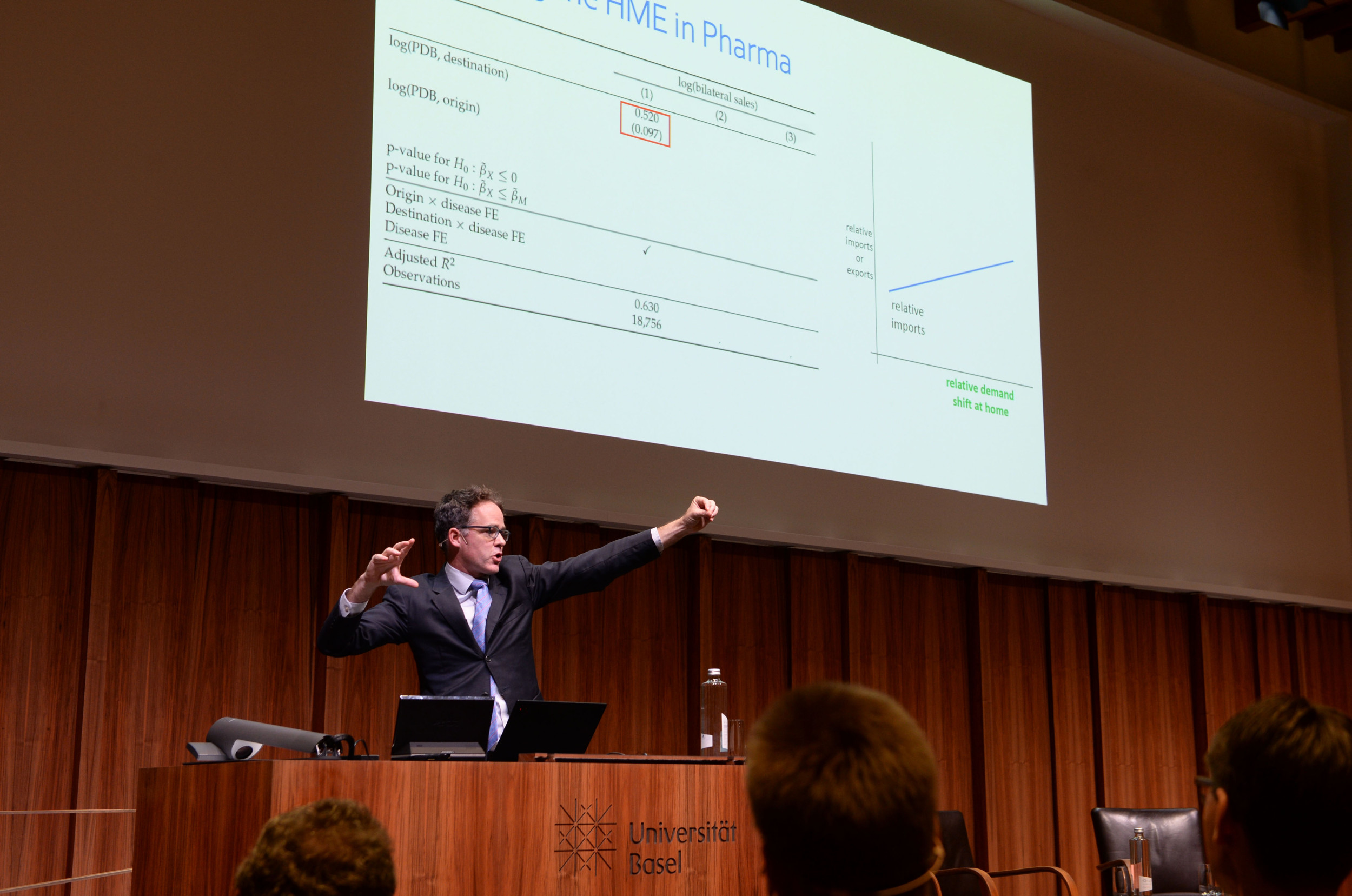The talk is part of the "Lecture Series on Innovation in the Global Economy". The series provides a platform for renowned researchers in Business and Economics to present their research results and thoughts on “Innovation in the Global Economy” to a broad audience. The events tackle the challenges of globalization and new technologies for society, policy makers and companies.
Third lecture: How important is Home-Market Size for Research in the Pharmaceutical Industry, and beyond?
Prof. Dave Donaldson / Speaker
Click here to read more about Prof. Dave Donaldson
Class of 1949 Professor of Economics at the Massachusetts Institute of Technology (MIT) in Cambridge (USA). He teaches and carries out research on trade, both international and intranational, with applications in the fields of International Economics, Development Economics, Economic History, Environmental Economics, Urban Economics, and Agricultural Economics. He has studied, among other topics: the welfare and inequality effects of market integration, the impact of improvements in transportation infrastructure, and how trade can mitigate and exacerbate the effects of climate change. This work was awarded the 2017 John Bates Clark Medal, given by the American Economic Association to the US-based economist “under the age of forty who is judged to have made the most significant contribution to economic thought and knowledge”, as well as an Alfred P. Sloan Research Fellowship and several grants from the National Science Foundation.
The topic of pharmaceutical R&D and the importance of the home market attracted a diverse audience from academia and industry representatives to students of economics in the Aula of the Kollegienhaus at the University of Basel. Prof. Rolf Weder opened the event by highlighting the importance of the pharmaceutical industry as an innovation and manufacturing leader, for both Switzerland as a whole and the region of Basel in particular. He then introduced the speaker, Prof. Dave Donaldson of MIT as the co-author of the paper that inspired the event: “The More We Die, The More We Sell?” which was published in the Quarterly Journal of Economics in 2019.
Prof. Donaldson presented the main findings from the study by drawing on a (maybe suspiring) “twist” of textbook economics: in most standard market equilibrium models, the demand curve slopes downwards (people buy less when prices rise) and supply slopes upwards (firms want to sell more when prices rise). However, with the presence economies of scale, supply can also be downward-sloping. Economies of scale can occur in cluster regions where many firms of the same industry are closely located to each other, much like the pharmaceutical cluster in Basel. Whenever such economies of scale are present, the so-called home market effect may be observed: a large demand for certain goods in the home market leads to relatively lower prices and this makes it attractive to export that good. Hence, contrary to popular belief, more demand at home leads to more exports rather than imports of the good. The stronger the supply curve slopes downward, the stronger the home market effect becomes. The big question remains: what drives and changes local demand? For the case of pharmaceutical companies, Prof. Donaldson and his colleagues assumed successfully that demand for pharmaceutical drugs can be predicted using the demographic composition of a country. Simply speaking, certain diseases can be associated with certain age groups (for instance, Alzheimer’s is predominantly a disease occurring in older people). Using these predicted disease burdens, local demand for certain drugs can be predicted for each country. Using these demand-shifters, Prof. Donaldson finds strong evidence that countries tend to export those drugs for which they have a relatively high local demand. The home market effect exists as a statistical phenomenon in the pharmaceutical industry.
After the highly interesting presentation, a panel consisting of Prof. Donaldson, Dr. René Buholzer of Interpharma and Prof. Weder sought to critically mirror the findings of Prof. Donaldson with the practical reality of the pharmaceutical industry in Switzerland. Dr. Buholzer and a participant from the crowd both commented that Switzerland may be an outlier in these statistics as a small country with a small home market. Pharmaceutical companies in Switzerland produce for the whole world, not just the Swiss market. This was a welcome input, since it showed the different worldviews between trade economists and representatives from the industry. Prof. Donaldson pointed out that the home market may be very similar to other, related markets in terms of demand. For the case of Switzerland, the home market in terms of disease burdens is very similar to other European countries but that does not lessen the relative importance of the home demand. Hence, even if Swiss pharmaceutical companies produce for a global market, the relatively strong demand for certain drugs and treatments will still influence the direction of innovation and production towards those products. At least that is what the theory predicts and what the data tells us on average. Lastly, Prof. Donaldson referred to the importance of economies of scale on an industry level and how policy can support them. One major mechanism to why they occur is the spread of ideas within an industry cluster and this is why policy makers should subsidize the flow of ideas.
After the insightful and lively discussion, the panel participants and members from the audience continued their fruitful exchange at the apero.



